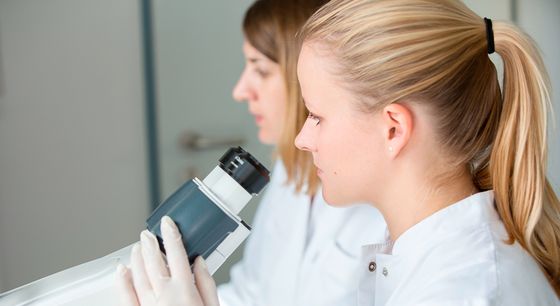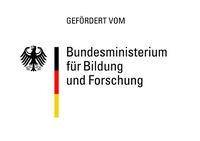SYS-Stomach
SYS-Stomach - Identification of predictive response and resistance factors to targeted therapy in gastric cancer using a systems medicine approach
Coordinators: Prof. Dr. Birgit Luber, Dr. Dieter Maier
The project is supported by the German Federal Ministry of Education and Research (BMBF) within the framework of the e:Med research and funding concept.
Gastric cancer (GC) is the fifth most common cancer worldwide. Treatment options for GC patients include surgery, chemotherapy and radiation therapy. However, the overall survival rate remains unsatisfactory and new treatment options are urgently required.
Novel drugs targeting members of a family of receptor tyrosine kinases including human epidermal growth factor receptor-2 (HER2) and epidermal growth factor receptor (EGFR) have shown mixed success in clinical trials. While the HER2 antibody trastuzumab has been approved for GC treatment, the EGFR antibody cetuximab recently failed in a phase III clinical trial as GC treatment.
The consortium aims to answer clinical questions about predictive factors regarding gastric carcinoma HER2 positive trastuzumab responders, cetuximab responders and specific differences in reaction to HER2 and EGFR targeted treatments.
We will apply systematic molecular and, motility focused, cell phenotypic measurements. From these we derive probabilistic models of the basic signalling networks coupled to cellular phenotypes and agent based cellular behaviour models which give rise to emergent tumor characteristics. These models together with biostatistical methods will inform conclusions about the mechanisms leading to differences in the response of GC cell lines treated with trastuzumab or cetuximab, respectively. The models will be validated against 3D-cell culture and clinical sample derived molecular and morphometric tumor characteristics based on MALDI Imaging Mass Spectrometry, a powerful tool for investigating the distribution of molecules within tumor samples through the direct analysis of tissue sections. Validated models in conjunction with biostatistical methods will be used to derive multi-modal molecular profiles to predict potential response and resistance factors of HER2- and EGFR-target agents. These response predictors will be validated in tumor collectives of GC patients treated with either trastuzumab or cetuximab.
Subprojects in SYS-Stomach
SP 1 Systematic molecular and phenotypical characterization of gastric cancer cell lines
SP 2 Knowledge management and biomarker discovery
SP 3 Multi-level analysis of gastric cancer data
SP 4 Agent-based tumour models to define adjuvant therapy approaches
Partner of the SYS-Stomach consortium
Prof. Dr. Birgit Luber (Coordinator), Institute of Pathology, Technische Universität München
Dr. Dieter Maier (Coordinator), Biomax Informatics AG, Planegg
Prof. Dr. Dr. Fabian Theis, Institute of Computational Biology, Helmholtz Zentrum München, German Research Center for Environmental Health, Neuherberg
Prof. Dr. Michael Meyer-Hermann, Department of Systems Immunology, Helmholtz Centre for Infection Research, Braunschweig
Prof. Dr. Axel Walch, Department of Analytical Pathology, Institute of Pathology, Helmholtz Zentrum München, German Research Center for Environmental Health, Neuherberg
Prof. Dr. Florian Lordick, University Cancer Center Leipzig, University Clinic Leipzig, Leipzig
Publications
High-resolution MALDI-FT-ICR MS Imaging for the analysis of metabolites from formalin-fixed paraffin-embedded clinical tissue samples. Buck A, Ly A, Balluff B, Sun N, Gorzolka K, Feuchtinger A, Janssen KP, Kuppen PJ, van de Velde CJ, Weirich G, Erlmeier F, Langer R, Aubele M, Zitzelsberger H, Aichler M, Walch A. J Pathol. 2015 May 12. doi: 10.1002/path.4560. [Epub ahead of print] PMID:25965788
Proteomic and metabolic prediction of response to therapy in gastric cancer. Aichler M, Luber B, Lordick F, Walch A. World J Gastroenterol. 2014 Oct 14;20(38):13648-57. doi: 10.3748/wjg.v20.i38.13648. PMID:25320503
Epidermal growth factor receptor (EGFR) is an independent adverse prognostic factor in esophageal adenocarcinoma patients treated with cisplatin-based neoadjuvant chemotherapy. Aichler M, Motschmann M, Jütting U, Luber B, Becker K, Ott K, Lordick F, Langer R, Feith M, Siewert JR, Walch A. Oncotarget. 2014 Aug 30;5(16):6620-32. PMID:25216514
Image analysis of immunohistochemistry is superior to visual scoring as shown for patient outcome of esophageal adenocarcinoma. Feuchtinger A, Stiehler T, Jütting U, Marjanovic G, Luber B, Langer R, Walch A. Histochem Cell Biol. 2015 Jan;143(1):1-9. doi: 10.1007/s00418-014-1258-2. Epub 2014 Aug 26. PMID:25156293


